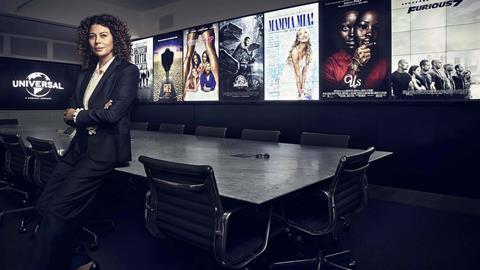The chairman of Universal Filmed Entertainment Group discusses the decision to send Trolls World Tour straight into the home, the studio’s groundbreaking, revenue-sharing PVoD deals with exhibitors, and the one thing she wishes she had done differently this year.
As the pandemic brought Hollywood to its knees, Donna Langley, the chairman of Universal Filmed Entertainment Group (UFEG), was the driving force in leading the industry back into production with the UK shoot of Jurassic World: Dominion. Against a backdrop of cinema closures, she and her executive team pioneered straight-to-premium VoD (PVoD) releases in the US on the likes of Trolls World Tour, struck game-changing theatrical and PVoD revenue-share strategic alliances with North American exhibitors, and postponed the release of blockbuster prospects such as Fast & Furious 9, now set for May 2021.
UK-born Langley became sole chairman of UFEG in 2019 and has steered the motion picture group — which encompasses Universal Pictures, Focus Features, DreamWorks Animation, Universal Pictures International and Universal Pictures Home Entertainment — through arguably the most turbulent nine months in the studio’s 108‑year history.
After beginning her career at New Line, Langley joined Universal Pictures in 2001 as SVP of production. She subsequently served as president of production and co-chairman and was named chairman in 2013. Since then, she has presided over the studio’s two biggest box-office years, led Focus Features’ global realignment with Universal Pictures International, overseen the integration of DreamWorks Animation, and launched the global talent development and inclusion group.
What a year it has been. What is your most memorable moment?
In March we sent everybody home from the office and I came back to the studio a couple of months later to pick up some things. I was the only person here and just walked around seeing snacks left on desks, sweatshirts over the backs of chairs, posters advertising movies that were set to come out in the summer that were not going to come out until the next year. It was like a science-fiction movie.
How did you adapt to working from home?
I’m up in Ojai at the moment, which is north of Los Angeles. Even though I’m on Zoom video calls all day long, I’m not surrounded by people, so it’s a much more individual and isolated way of working. I’ve been able to reach into parts of the organisation as a leader in a way that I would not ordinarily do and that has been really gratifying. I’m able to pop in and have chats with people and give updates. That’s been extraordinary, and I hope that’s something I carry into the new era.
Tell us about returning to production on Jurassic World: Dominion in the UK.
[Around April] at the very beginning [of the pandemic], I didn’t think we would be successful in being able to get a movie the size of Jurassic World: Dominion back up. At that time, we didn’t have a lot of information about testing, we didn’t have a lot of information about contact tracing, and those are two very important pillars. But what I did say is that we’ve got this movie sitting here at Pinewood Studios, it’s costing us money, we have to figure out how to finish it. We were 10 days into shooting, so why don’t we just create a playbook and imagine what it would entail?
We worked really closely with the British Film Commission, with the guilds and the labour unions here in the US, and we were able to demonstrate that it was in fact possible. I would call it a feasibility study. I look at Jurassic World: Dominion as the movie that led the industry safely back into production.

What else has Universal made during the pandemic?
We have been successful in producing a number of films, and of course our animation continues. For the live-action films, I want to say we’ve completed between six to eight of varying budget sizes and complexity, Jurassic World: Dominion being the most complex, between July and now. And coincidentally, we are about to wrap the final movie that we have in production [Dear Evan Hansen, in Atlanta], and then we don’t have anything ready to go back into pre-production until February or March. It’s a happy accident that we have a hiatus during this second spike.
It is worth touching base on animation because we released The Croods: A New Age in whatever movie theatres were available this past weekend [late November Thanksgiving weekend] and internationally it will roll out through February, and it will go into the home here in the US. That movie was finished during Covid-19. Animation, between DreamWorks Animation and Illumination, which produces in Paris, has been very successful in maintaining almost 100% productivity.
The pandemic has accelerated the change in audience viewing habits. Do you think this will have a long-term impact, and what are the prospects for theatrical and exhibition?
Consumer consumption of content has never been higher, so that’s great. Streaming, which was disrupting our business to begin with, will continue to disrupt and particularly this sort of legacy business. That said, I do believe theatrical is and will continue to be, on the other side of this, a very important part of the ecosystem. I don’t believe theatre-going and streaming are binary; both are part of how we like to consume content.
On the other side of this we are potentially going to see fewer screens, fewer movie theatres just by virtue of the small chains not being able to hold on, and some of the larger chains, in an effort to right-size their business, seeing some of their locations going away. That was already happening pre-pandemic. I don’t think fewer screens is going to mean less box office, necessarily — big blockbusters rarely occupy 100% of available screens and theatres, so I think we’ll be OK there.
It really is a question of how quickly can theatrical rebound, how long is it going to take to get the audience comfortable to go see a movie again, and what do they want to see in the movie theatre. We’re going to look at the economy, we’re going to look at the general mood.
You pushed Fast & Furious 9 and other tentpoles into 2021 to preserve their theatrical release. Is a wide theatrical release for a tentpole and the ensuing revenue waterfall still the most financially prudent way of releasing these movies for the foreseeable future?
The theatrical revenue driven by some of our tentpole titles remains very important to our bottom line. Global franchises like Fast & Furious, Jurassic World and Minions benefit from a robust moviegoing market and marketing campaign to support it. Seeing films like this on the big screen is a rite of passage for film lovers, and creating a new PVoD window weeks, rather than months, later allows consumers more opportunity to experience these blockbusters.
Universal has made game-changing moves this year, pushing Trolls World Tour straight to PVoD, and partnering on revenue-share PVoD deals with exhibition giants AMC and Cinemark in the US, and Cineplex in Canada. What prompted these deals?
Looking at that landscape, and looking at that inevitability, is what propelled us to make these deals with exhibitors. We were given an opportunity at the beginning of the pandemic, when all theatres were shut down and we were sitting there on the precipice of releasing Trolls World Tour and couldn’t do it, and so we put it into the home. What that enabled us to do, even though there were a lot of histrionics that played out in the press, is behind the scenes we were having robust conversations with these theatre chains.
And you can see now that we’ve made deals with three of them in North America, for now. Movies can go into theatres and 17 days later at the earliest they can then also go into the home. They can keep playing theatrically, there’s real optionality there. It is creating an additional window, and therefore an additional revenue stream for the movie in its life cycle. We believe it’s additive, not cannibalistic on any level. And we’ve seen that play out with Trolls World Tour and some of our other movies in the marketplace.

We like it because it gives the audience much more flexibility: they can see a movie in a theatre, a couple weeks later they can see it rented again at home. I know my kids love to do that… It’s better for us, more efficient in the deployment of our marketing dollars. We can launch the movie, and then pivot and use a lot of that noise and those marketing dollars to create that noise to push into the home.
And it’s great for the exhibitors because they get a cut of the PVoD revenue, so it’s giving them a lifeline. Again, this is all opportunity in crisis, but I think it’s a win-win for everybody. And when we look out over the next few years, PVoD will be a critical piece of our distribution life cycle. It’s not the be-all and end-all; we’re going to need to continue to be nimble and forward-thinking and think about streaming and the other ways that people consume their content.
We create content for global audiences, our marketing campaigns create cultural conversation and big movie events. We’ll continue to do that, and then we’ll deploy all of that volume and push it into whatever digital platform — PVoD, SVoD, AVoD — is available to us. I think that’s the future.
Will the PVoD deals you have signed with exhibitors extend into a post-pandemic world?
Yes, they will. I’m not going to speak about financials but they are, absolutely. The terms of the deals are designed to extend beyond Covid‑19. This is not us saying, “Let’s just do this for 2020 and 2021 and see where we are.”
Can we expect similar deals with international exhibitors?
PVoD is most successful in the US where consumer habits are in tune with the digital rental transactions. It’s robust in the UK, and to a degree in the Nordics and in Germany, but beyond that it’s not really a habitual thing. We would love it, particularly because two of the chains that we have deals with in the US have footprints in those territories, but it’s not a requirement. Those conversations hopefully will happen at some point, but we’re not there yet.
Universal has been one of the most aggressive studios in terms of shortening the exclusive theatrical window. Has that always been part of your mandate?
The short answer is absolutely. The specific initiative predates me. If you recall, Jeff Shell, prior to becoming CEO of NBCUniversal at the beginning of this year right before the pandemic, was the chairman of UFEG, and in the years that he was here, this was a conversation that he was having internally, certainly, and on occasion with exhibition. But there was no incentive at that time for exhibition to move and to do it, so it really took these unprecedented times for everybody to get in the room and see the mutual benefit.
WarnerMedia has just eliminated theatrical exclusivity in what it says is a unique one-year deal. Is it a matter of time before the exclusive theatrical window vanishes in Hollywood?
The deal we struck with our partners in exhibition for movies to appear on PVoD as early as 17 days post-release is intended to lean into the theatrical model and sustain the overall health of the distribution ecosystem. We believe in theatres and the theatrical experience. WarnerMedia’s announcement eliminating the theatrical exclusivity of its 2021 slate is a different model altogether, whereby more subscribers are driven to HBO Max. While we’re aware of the impairment the industry is going to face into 2021, we are still bullish on exhibition and want to provide a steady supply of content to theatres.
How would you describe relations between the studio and exhibition now?
I think their greatest fear was the shortening of the window would somehow be the beginning of the end of theatrical moviegoing, or the studios perhaps had something else in mind. We’ve been able to demonstrate the opposite of that — we’re doing this to enable the continuation of theatrical, and to bolster our respective business models.
The conversations that are led by our distribution executives, Peter Levinsohn [vice chairman, chief distribution officer, UFEG], Jim Orr [president, domestic theatrical distribution, Universal Pictures] and Veronika Kwan Vandenberg [president of distribution, Universal Pictures International] on the international side are very robust.
I would say our relationship with [exhibition] is great. It wobbled briefly when we opportunistically and — for the survival of our company — put Trolls into the home. We had no choice. We had to monetise the movie and it was a perfect time to do it when families were at home and needed something to entertain their kids. But once exhibition got over the outrage of that, they very quickly, led by Adam Aron of AMC — he was the first one to the table — got back into a virtual room with us to say, “Okay, how do we make this work, how do we make this mutually beneficial?”
How does the relationship with NBCUniversal’s new premium video-streaming service Peacock work, and what is the role of the studio within the NBCUniversal ecosystem? Will you be producing some movies exclusively for Peacock, for example?
Peacock is still in its early stages and just from being on calls with Matt Strauss [Peacock chairman] and the leaders of Peacock, it’s doing better than expected in terms of the number of sign-ups and so on. The initial rollout of Peacock was not intended to include an output deal, if you will, for the studio onto Peacock. But who’s to say what the future will bring? I think we’re all in agreement streaming will be a part of our ecosystem down the road. It’s just a question of how we get there.
Turning to international, are there any particular growth regions that you are looking at? Are you exploring local-language opportunities?
We recently redesigned our international operation primarily by introducing Veronika Kwan Vandenberg to the company and for [predecessor] Duncan [Clark] to exit. If we weren’t in a pandemic, we would probably be off to the races on some of these things. Veronika certainly has plans, but nothing rolled out yet in terms of local-language. In terms of the growth opportunities, we need to watch where some of these territories rebound. We continue to look at Asia and we are continuing to look at Vietnam, which is adding screens and movie theatres exponentially. We also continue to lean into those other territories as we always have done.
You launched Universal’s global talent development and inclusion group — the first major studio to have a department working with both production and workforce in this area. How can the industry support inclusion in a way that leads to genuine opportunity for under-represented people?
Where the industry can continue to lead change is in the support of talent in front of and behind the camera, and continue looking for opportunities to tell stories that reflect the world we live in, to think of when it comes to casting, ways of telling the story that might perhaps shift the original intention. Certainly, when it comes to folks behind the camera, giving opportunities.
We are very focused on our workforce in terms of creating opportunities for diversity inside our company, and then once people are inside our company, retention — really working on that culture piece, to ensure that no matter what country you work in, if you’re working for Universal there’s a real focus on what the experience is.
From Comcast down there’s a lot of resources available to us and we weren’t starting from scratch on day one in this most recent iteration of Black Lives Matter after the death of George Floyd [in May this year]. Fortunately, we have a group that is dedicated to this work and they have already done a huge amount. We have invested and been intentional about the types of movies that we make and with whom we make them, and who we’re speaking to in terms of an audience perspective, but there is more to do.
Looking back at this year, is there anything you would have done differently?
I would have taken a desktop [computer] home in March as opposed to my iPad.
What’s the one thing you’re pinning your hopes on for 2021?
I’m hoping for some clarity. What’s been so difficult for all of us this year is there is not a real line of sight into what’s happening — a combination of the way the coronavirus behaves and our political climate. I’m really looking forward to rounding the bend.
And looking further ahead, what excites you about the future of the film industry?
Well, I’m energised by how dynamic everything is — everything is changing. We have all been anticipating this change for more than five years, and it’s been a slow burn. While I do not wish the pandemic had happened, it has in every way accelerated all of the trends that we’re seeing. It’s now upon us.
There is so much reason for optimism, whether you’re a streaming company or a more traditional legacy company like ours that is [part of] a big media company that has so many assets and opportunities. We have a muscle memory based on experience and expertise and access to talent that enables us to make the best in class, feature-length content. That’s never going away, and so what we’re doing right now is figuring out where is the best place to put it so it gets to the maximum amount of audience members and eyeballs.


























No comments yet